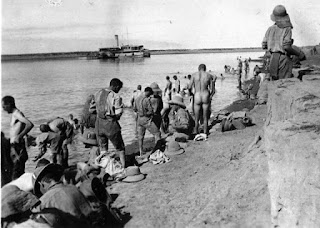First World War centenaries are coming thick and fast! Looming this summer is 'the big one', the Battle of the Somme, which was the first offensive of the war during which the British relied on its volunteer soldiers rather than regular troops. Just before the Somme, at the end of May, we'll be remembering the Battle of Jutland, the only major sea battle of the conflict. And this time last year we were paying tribute those who fought and died in the fighting at Gallipoli in 1915.
 |
British troops on the banks of the River Tigris
during the siege of Kut in early 1916
|
Having been forced to retreat while advancing towards Baghdad, the Anglo-Indian force had taken refuge in the Arab town of Kut-al-Amara, on the River Tigris, in early December 1915. There they remained, under siege, until 29 April 1916, when they were forced to by surrender by the threat of starvation and disease that had reached epidemic proportions.
 |
| Captain Warren Sandes |
‘Nizam Bey was a tall and pompous individual, very stiff and erect and typically German in appearance except that he wore the Turkish head-dress. He demanded in an arrogant manner to be taken at once to our headquarters … Some of the Arabs met the procession as it entered the town and rushed forward to kiss the Turkish officer’s boots. He kicked them in the face.’
Sandes goes on to describe the distress of Arab townspeople who dreaded the punishment they faced for 'collaborating' with the British:
‘Confusion and fear reigned in the now crowded streets. The old Sheikh was distracted at the prospect of surrender. Torture and death awaited him and his sons ... An Arab contractor who had sold supplies to our Mess had committed suicide rather than await the arrival of the Turks. It was pitiful to have to witness such scenes of terror and despair. The Arab women wailed and wept. The men eyed each other with suspicion, never knowing who would denounce them when the Turks marched in. Kut became a nest of Arab spies and traitors. The people hated us for bringing such misery upon them and dreaded the Turks whose ways they knew only too well.'
While we pay tribute to the trials of our fellow countrymen during the Great War, we should not forget those who were dragged into the conflict through no choice or fault of their own, and paid a dreadful price as a result.





